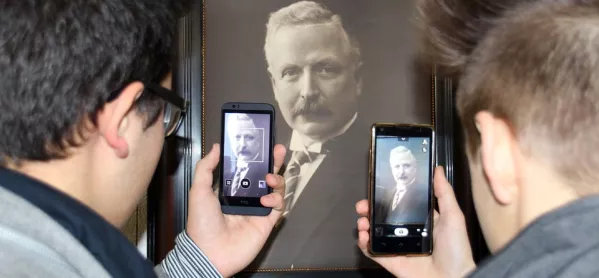Teenagers rarely give much attention to bluebells. And yet in the middle of their outdoor-pursuits residential trip, Year 8 students from King Edward VI Aston all-boys’ school in Birmingham are taking a break from zip wires to take close-ups of rain-soaked flowers.
This is testimony to photography’s allure. At King Edward’s Aston we run a twice-weekly photography club and offer photography as an optional enrichment course in Year 10. We teach the subject using both analogue (film) and digital and find that many art students integrate film photography into their coursework. We have even had to extend our darkroom to accommodate demand, appealing in Amateur Photographer for donations of equipment.
But why do our students like photography so much? And, perhaps more importantly, what is photography’s academic value?
Photography is universal
Photography transcends social class and many use it daily. Kodak once told consumers to “always carry a camera”. Now teenagers carry their smart phone “Box Brownie” at all times. Those who are inclined towards science and maths often enjoy the technical dimensions; while for those who struggle to draw, photography provides a chance to be visually creative.
It teaches practical skills
We find that boys tend to like learning practical skills. Digital cameras have “de-skilled” photography, but our students focus manually, use lighting and tripods, load film and mount prints. Subjects like photography - along with art, music, drama and DT - have immense value for teenagers as a balance for other parts of the curriculum where words and numbers count so highly.
It broadens horizons
Our culture of constant selfies and YouTube uploads has its dangers: safeguarding risks, egocentrism, over-sharing and the over-documentation of events inhibiting our ability to remember them. Teaching photography can counteract these risks, as students learn about being behind the camera instead of always in front of it.
It enriches other subjects
Photography is an art form that is also full of maths, chemistry, physics and IT. Our physics students can use real pinhole cameras to apply pinhole theory and then process the images. History students can explore the impact of an image of Churchill by photographer Yousuf Karsh in 1941, while geography students can add an extra dimension to field trips by taking photographs. Photography is where art and science meet, so it can help students to think outside subject confines. Maybe a new GCSE and A-level syllabus covering photographic art and photographic technology equally would broaden its appeal and better equip students to study photography in higher education.
It doesn’t require expensive kit
True photographers can take great pictures with simple equipment; the eye is more important than the camera. Schools don’t need to invest in expensive cameras: they can introduce students to photography using only their phones.
Photography helps students to express themselves and develop visual perception. What’s more, it means that young people might think twice before pressing the button and posting an image online. So let’s get more Year 8s photographing flowers - creating, rather than merely consuming, the output of an entertainment-obsessed age.
David Healey is the photography tutor at King Edward VI Aston School in Birmingham, and vice-chairman of the Analogue Group of the Royal Photographic Society
Want to keep up with the latest education news and opinion? Follow TES on Twitter and like TES on Facebook

